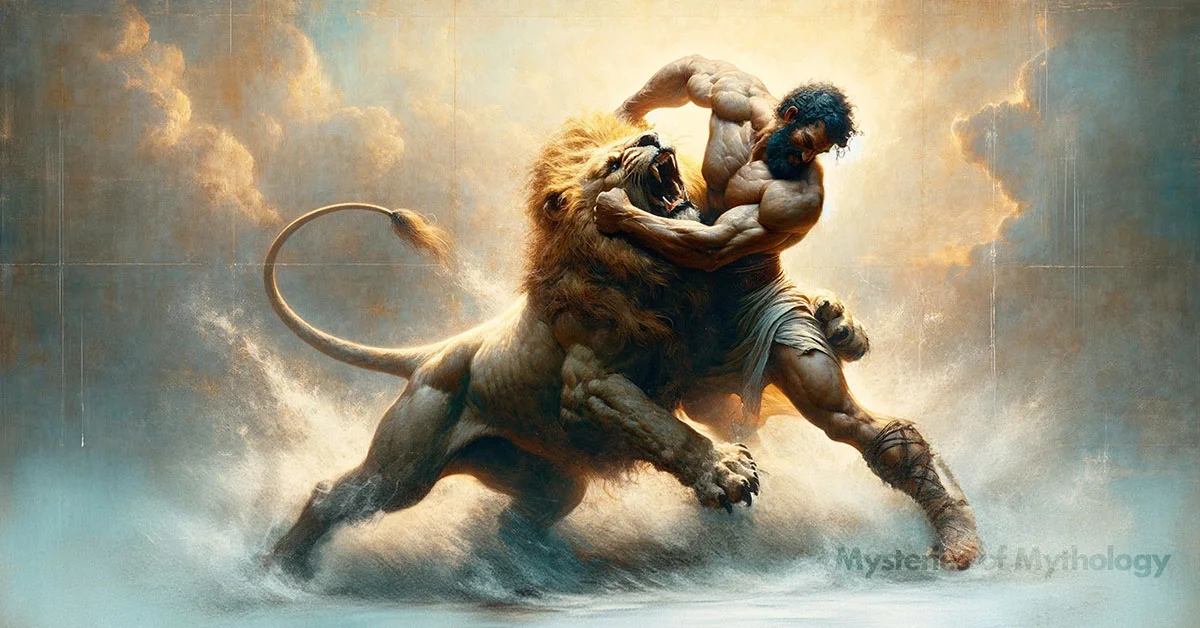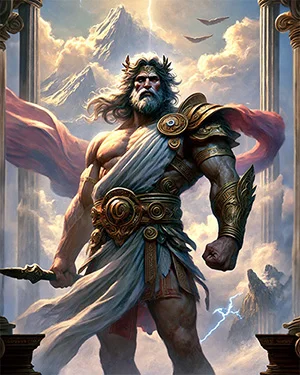Overview
Our story begins with Zeus—being Zeus—having an affair… This time, it was with Queen Alcmene.
Zeus had been looking down over the land of Greece and saw a land ravaged by war and dangerous beasts. He knew that peace would be restored to the land if he had a hero.
It so happened that Zeus had fallen in love with Queen Alcmene and disguised himself as her husband, Amphitryon, so he could sleep with her. To Alcmene’s surprise, the real King Amphitryon returned early from war later that day and also made love to his now very confused wife.
Eventually, she gave birth to twins: one of them was Heracles, Zeus’ son, and the other was Iphicles, Amphitryon’s son. But things were about to get a lot more complicated.
Zeus’ wife, Hera, wasn’t new to her husband having affairs, but as they say, this was the straw that broke the camel’s back. Hera made it her life’s goal to make Heracles’ life a living hell, even before he was born. Hera attempted to delay Heracles’ birth so that another child of Zeus’ lineage, Eurystheus, would be born first and become king.
Watch the related video
Heracles grew up just trying to live a simple life, but Hera wasn’t going to let that happen. Luckily, Heracles got the strong gene from his father, and Zeus made sure he drank Hera’s breast milk, the ultimate godly protein shake.
After being driven mad by Hera and killing his family, Heracles had to overcome multiple heroic challenges, most famously the twelve labours to atone for his guilt. After completing the labours, Heracles, not satisfied, went on a few more adventures.
He attempted to settle down but struggled with his family life. His new wife, Deianira, was worried that Heracles no longer wanted her. She thought what she was giving him was a love potion, but it was actually a lethal poison.
Heracles, in absolute pain, built a funeral pyre and set himself on fire. Zeus took Heracles’ soul to Olympus and made him a god. Heracles married Hebe, the goddess of youth, and they lived happily ever after.
Want to know more? Read on…
Etymology
The name Heracles comes from the name of the goddess Hera and the Greek word kleos (meaning “glory”). Together, they can be translated as “Hera’s glory.” So the irony is that his name is a homage to the goddess who was his lifelong enemy. That is probably another reason she hated him.
Pronunciation
ENGLISH
Heracles
GREEK
Ἡρακλῆς
PHONETIC
[HERR-ə-kleez]
IPA
/ˈhɛrəkliːz/
Alternate Names
According to some traditions, Heracles was originally born Alcaeus or Alcides in honour of his grandfather Alcaeus, the son of the famous hero Perseus. He was only renamed Heracles later in an attempt to win over a furious Hera (which had the opposite effect). He was known as Hercules in Roman literature.
Attributes
In Greek mythology, he was known as the strongest man ever. He was always shown as big and muscular. You can spot him easily in stories and statues by his signature gear: a hefty club, a bow, and the skin of the Nemean Lion, which he wore as armour after defeating the beast. In most artistic depictions, he has a beard. He was considered extremely good-looking by both women and men.
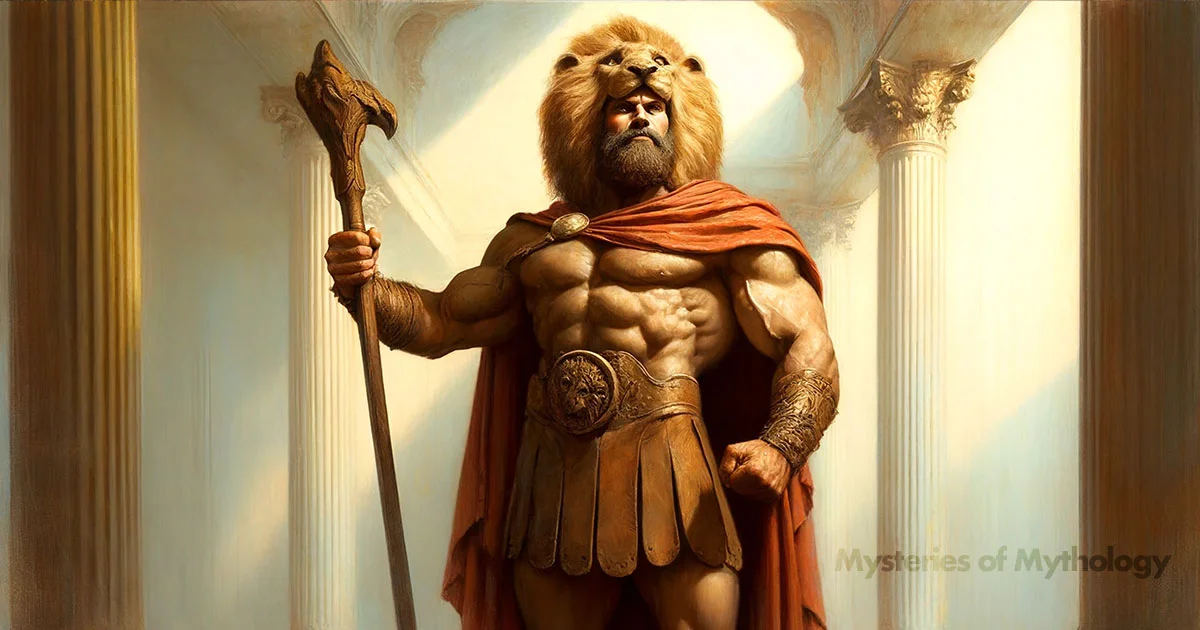
Family
Heracles had quite the divine and heroic family tree. He was the son of Zeus, the king of the Greek gods, and Alcmene, a mortal woman with royal blood—her father, Electryon, was the king of Mycenae and a descendant of the hero Perseus. Alcmene’s husband, Amphitryon, who raised Heracles, also boasted a notable lineage that traced back to Perseus through his father, Alcaeus.
Growing up in Thebes, Heracles shared his childhood with his half-brother Iphicles. Iphicles’ son, Iolaus, would later become a loyal companion to Heracles, joining him on numerous adventures.
Throughout his life, Heracles had various consorts, including Megara, Omphale, Deianira, and finally, Hebe, the goddess of youth. His children included significant figures such as Alexiares and Anicetus, Telephus, Hyllus, and Tlepolemus, each forging their own paths in mythological history.
Heracles’ romantic escapades were as legendary as his feats. He left behind a vast number of children known as the Heracleidae. These descendants played a significant role in Greek history, conquering numerous cities after the Trojan War.
Mythology
Birth and Childhood
When Zeus looked for a partner to birth a hero to bring peace to Greece, he chose Queen Alcmene. Alcmene was a descendant of Perseus, Zeus’s son, who made her part of a noble and heroic bloodline.
So yes… you read that correctly: Zeus chose his granddaughter to give birth to his hero son.
Zeus tricked Alcmene by disguising himself as her husband Amphitryon, who was away at war. The same night Zeus slept with Alcmene, Amphitryon returned home early and also slept with her. This led to Alcmene having twins: Heracles, the son of Zeus, and Iphicles, the son of Amphitryon.
From the start, Heracles was disliked by Hera, Zeus’ wife. Hera was angry about Zeus’ affairs with mortals and his children with them. It wasn’t the first time (and wouldn’t be the last), but this affair enraged Hera. She even tried to harm Heracles before he was born.
When Alcmene was about to give birth, Hera tricked Zeus into promising that the next male child born in their family would become High King.
Hera forced her daughter, Eilethyia, the goddess of childbirth, to delay the birth of the twins Heracles and Iphicles long enough for Alcmene’s cousin, who was also pregnant, to give birth first.
Alcmene’s cousin, also from the bloodline of Zeus, gave birth to Eurystheus who became the High King instead of Heracles.
Though Zeus couldn’t reverse his son’s lost kingdom, he would give his son every chance he could to be a hero king.
After Heracles was born, Zeus brought him to Hera’s bedchamber on Olympus.
While she slept, Zeus placed the infant on Hera’s breast, allowing Heracles to feed on her divine milk and gain some of her power. Startled, Hera awoke and threw the baby off, spraying milk across the heavens. This divine milk settled in the sky, forming what we know as the Milky Way.
Zeus chuckled as he returned Heracles to his crib beside his mother.
Hera also tried to kill Heracles when he was just a baby by sending two snakes into his crib. While his brother Iphicles cried in fear, Heracles bravely grabbed each snake and strangled them. His mother found him playing with the dead snakes as if they were toys.
This shocked Amphitryon, and he asked the prophet Tiresias what would become of Heracles. Tiresias told him that Heracles would grow up to be a great hero. This was the beginning of Heracles’ challenging life, constantly under Hera’s watchful and hostile eye.
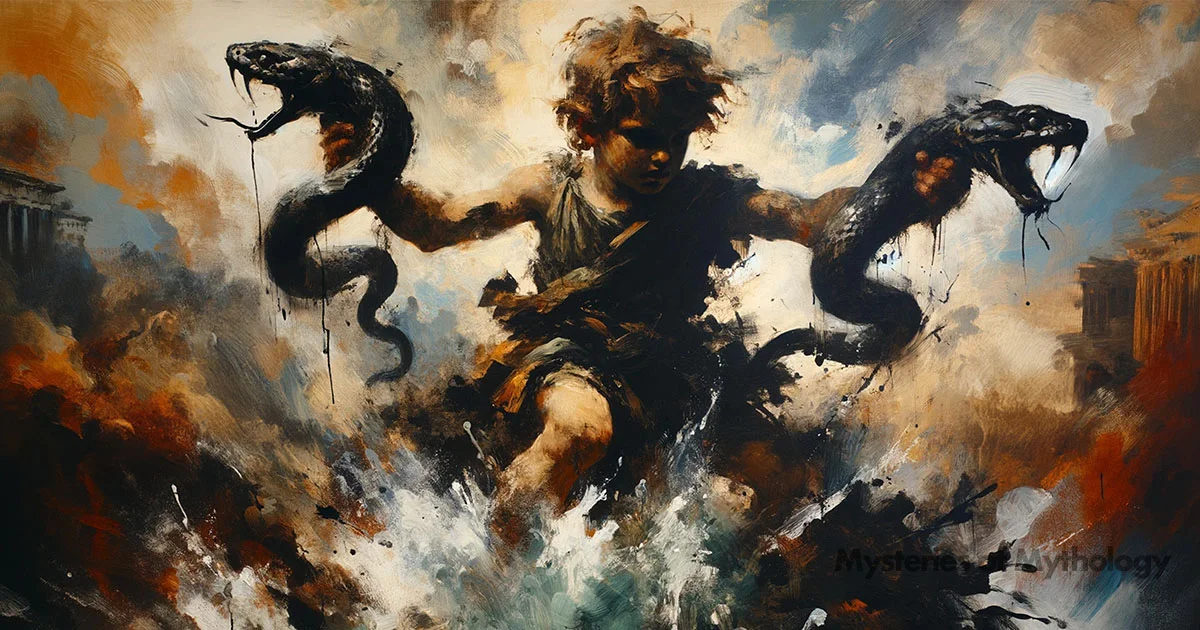
Early Life
As a young man, Heracles studied with the best teachers in Greece. He learned archery, music, and philosophy, but he struggled with his temper.
Combined with his supernatural strength, this made him dangerous to both friends and foes. Linus, his music teacher, discovered this the hard way.
While teaching Heracles to play the lyre, the young hero grew frustrated with the constant corrections. One day, after a particularly harsh critique, Heracles struck Linus on the back of the head with the lyre, killing him instantly.
In one version, Heracles was tried in a court. He quoted a law of Rhadamanthys, which stated that whoever defends himself against a wrongful aggressor shall go free. And so he was acquitted and received only a minor punishment. His temper would cause problems throughout his life.
Despite his potential, Heracles’ anger caused ongoing problems. Seeing the need for a change, Zeus, his father, sent him to live a simpler life as a cattle herder in Thespiae under the care of his foster father, Amphitryon.
While living this simple farmer’s life, Heracles encountered two women. The first was a woman named Kakia (also known as Vice). She was alluring and seductive. She offered him promises of comfort and luxury without any hard work, starting with a simple kiss, proclaiming herself the goddess of bliss.
The other woman, Arete (also known as Virtue), urged Heracles to reject Vice’s offer. She promised a life of honour and achievement, where luxuries were earned through hard work and perseverance.
Virtue highlighted that true fulfilment comes from facing challenges and enduring hardships. Inspired by Virtue’s words, Heracles chose the path of Virtue and sent Vice away.
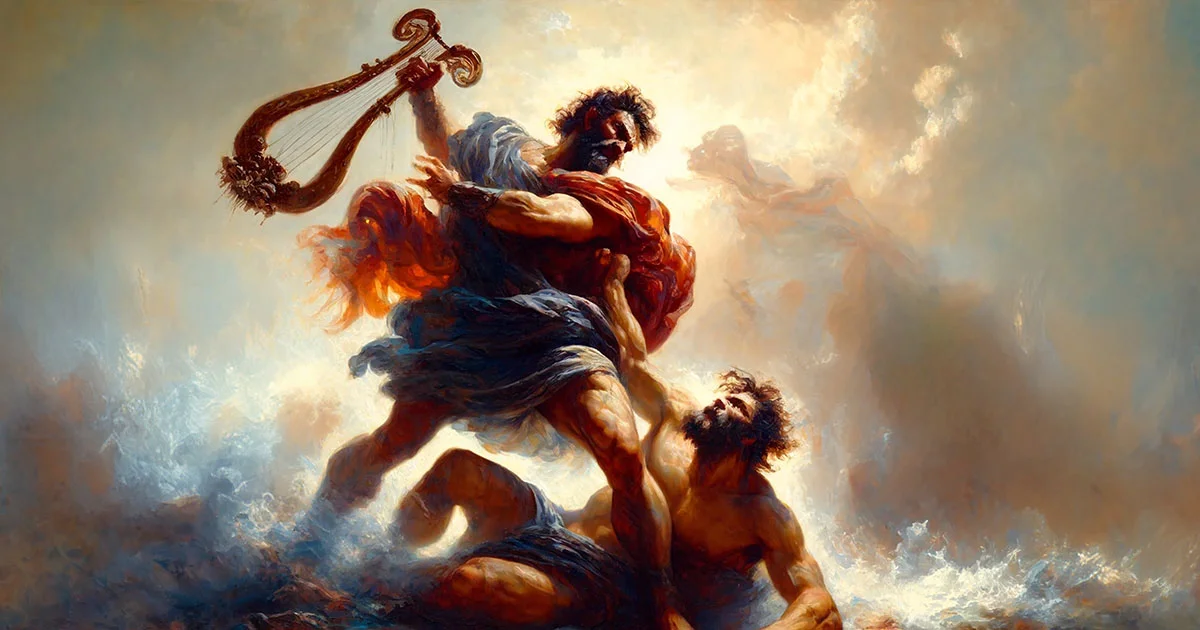
This decision led him to a life of discipline and hard work on the farm, which built his strength and character. His new life was interrupted by news of a fierce lion near Mount Cithaeron.
Determined to protect the local people, Heracles hunted and defeated the lion with his bare hands. King Thespius of Thespiae, grateful for Heracles’ bravery, hosted him in his home, which inadvertently led to Heracles fathering fifty sons with Thespius’s fifty daughters.
Heracles’ reputation grew, but so did Hera’s resentment.
When Amphitryon died in a war, Heracles took over the Theban army with divine help from Athena, who equipped him with weapons and armour from Olympus. Heracles led his army to victory against the Minyans, and upon returning to Thebes, he was honoured with the hand of King Thebes’s daughter, Megara, in marriage. They had three children and lived happily until Hera’s vengeance struck.
Heracles, unaware of Hera’s plotting, came home one day to find his door broken down. Rushing inside, he discovered his family missing. As he called out for them, several hideous monsters emerged from the shadows, advancing towards him.
Overcome with an unnatural rage, Heracles lashed out, killing one of the monsters instantly. The others tried to flee, but Heracles, in a blind fury, pursued and killed them all with his bare hands.
Only then did Hera lift her spell, revealing the true horror: the monsters were his own family.
Heracles stood in shock, seeing his wife and children lying dead before him. He desperately tried to wake them, tears streaming down his face, but it was too late. Hera’s magic had done its work, leaving Heracles to live with the guilt of their deaths.
Seeking redemption, Heracles exiled himself to Delphi to consult the Oracle, who, influenced by Hera, decreed that he must serve King Eurystheus of Mycenae for ten years. The Oracle also hinted that fulfilling these tasks could earn him immortality, as promised by Zeus. Determined to cleanse his guilt and hoping for redemption, Heracles set out to serve Eurystheus, marking the beginning of his legendary twelve labours.
The 12 Labours of Heracles
Heracles is best known for the Twelve Labors, a series of tough challenges he had to complete for his cousin Eurystheus, the High King of Mycenae.
Hera often helped Eurystheus devise the hardest and most dangerous tasks to try to defeat Heracles.
Originally, Heracles was supposed to do only ten labours. But, after he finished the tenth one, Eurystheus made up a weak excuse to make him do two more, making it twelve in total. The specific labours and their order, as described by the storyteller Apollodorus, are:
Labour One: The The Nemean Lion
King Eurystheus had always been jealous of his cousin Heracles, who had become famous for his strength and bravery. Unlike Heracles, Eurystheus was not brave and often had others fight his battles for him. When Heracles came to serve Eurystheus, he bowed to him, but Eurystheus suspected Heracles wanted to overthrow him. So, Eurystheus gave Heracles a challenge to complete ten difficult labours over ten years without any help or payment.
The first task was defeating a terrifying lion in Nemea, a village northeast of his kingdom. This lion was special; its golden hide couldn’t be pierced by any weapon, and its claws were sharper than swords. It was believed to be a descendant of Typhon, a giant powerful enough to nearly defeat Zeus. Everyone who had tried to kill the lion had failed.
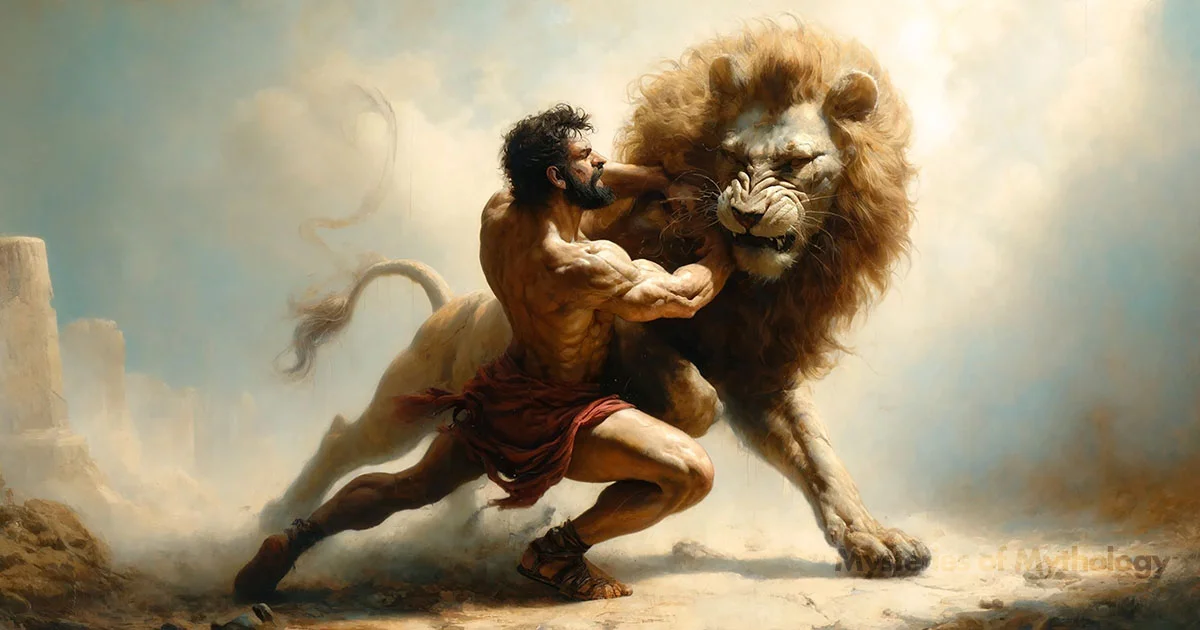
Knowing he couldn’t use weapons against the lion’s tough hide, Heracles spent months training, lifting heavy boulders and uprooting trees to increase his strength. Finally ready, he went to the lion’s den alone. Inside, he saw the remains of warriors and their shattered weapons. Shedding all the armour and weapons the goddess Athena gave, Heracles called out to the lion. As the lion charged, Heracles dodged and caught it by the neck. They fought fiercely for hours until Heracles managed to strangle the lion.
After killing the lion, Heracles used the lion’s own sharp claw to remove its hide. He wore the lion’s skin as a cloak and its head as a hood, which would protect him in his future tasks. Leaving his old armour behind in the lion’s lair, Heracles made a club from a giant oak tree. This club and the lion’s skin became his new weapons and armour.
Returning to Mycenae wearing the Nemean Lion’s pelt, Heracles surprised Eurystheus, who had not expected him to survive the encounter.
Labour Two: The Lernaean Hydra
For his second labour, Heracles had to kill the Lernaean Hydra, a terrifying water creature living in Lake Lerna near Argos. The Hydra had nine heads, with one that couldn’t be killed, and its blood was extremely poisonous.
When Heracles went to the lake, ready to fight after defeating the Nemean Lion, he was met with a surprise. Hera, trying to make his task harder, had placed a giant crab in the lake to attack him. Heracles charged at the Hydra and chopped off one of its heads, but two more grew back in its place. No matter how many heads he cut off, more would grow back, each time increasing the number.
To make things worse, the giant crab came out of the water and pinned Heracles down. Just when Heracles thought he was in real trouble, an arrow hit the Hydra. It was his nephew, Iolaus, who had come to help his uncle. With Iolaus’s help, Heracles was able to focus. They came up with a plan: Heracles would cut off the heads, and Iolaus would use a flaming torch to burn the necks, stopping new heads from growing.
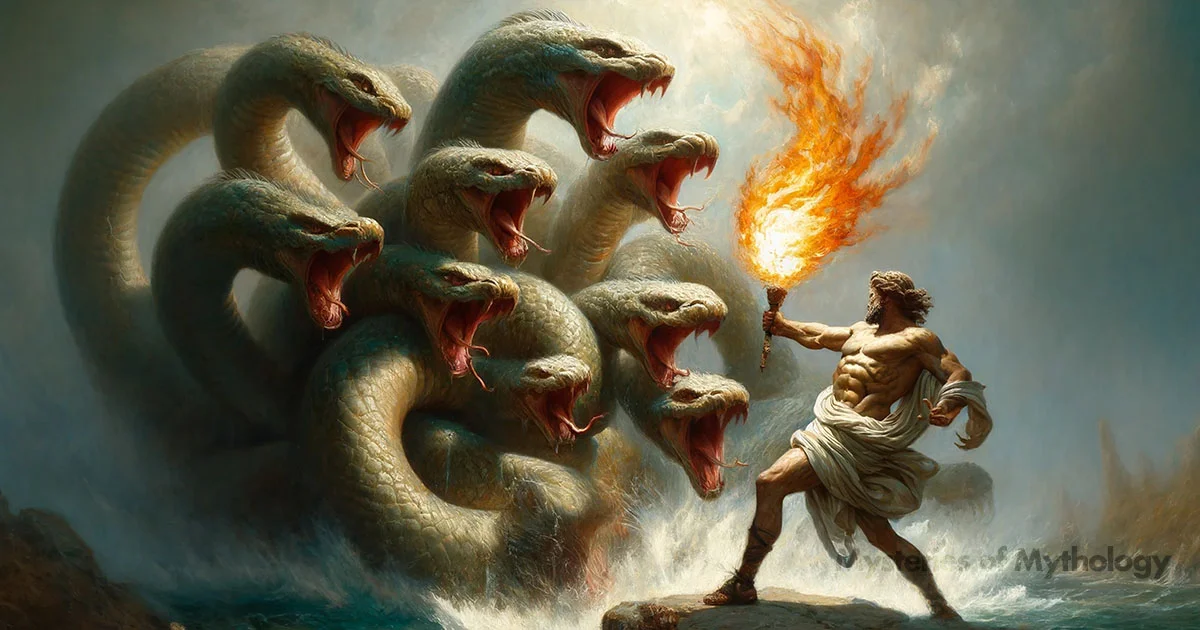
Together, they cut and burned until only the immortal head was left. Heracles cut it off and buried it under a heavy rock near the lake. Then, he dipped his arrows in the Hydra’s poisonous blood, making them lethal for his future challenges.
However, Heracles’s cousin Eurystheus, who assigned the labours, said this one didn’t count because Heracles had help from Iolaus. So, Heracles would have to do an extra task, though he didn’t know this yet.
After the battle, as Heracles and Iolaus left, Hera honoured the giant crab by turning it into the constellation Cancer in the sky.
Labout Three: Capturing the Ceryneian Hind
For his third labour, Heracles had to catch the Ceryneian Hind, a deer-like animal with shiny, golden antlers and bronze-like hooves, and bring it back alive. This animal was special because it was incredibly fast and belonged to Artemis, the goddess who used it to pull her chariot.
Eurystheus, who gave Heracles this task, thought it was impossible. He believed that even if Heracles caught the hind, Artemis would be furious and punish him because no human could stand up to a god.
Heracles chased the hind all the way to Mount Ceryneia, tracking it for a whole year. He didn’t want to hurt it, so he cleverly shot an arrow near the hind to startle it into jumping into the river Ladon. This slowed it down enough for him to catch it, tie its legs, and carry it over his shoulder.
When Heracles was leaving the mountain with the hind, Artemis appeared, angry and ready to protect her animal. Heracles quickly knelt and explained that Eurystheus was to blame. Just then, Apollo, Artemis’s twin brother, showed up to ease the tension. He explained that Hera, who disliked Heracles and the twins as Zeus’s illegitimate children, was behind Eurystheus’s actions.
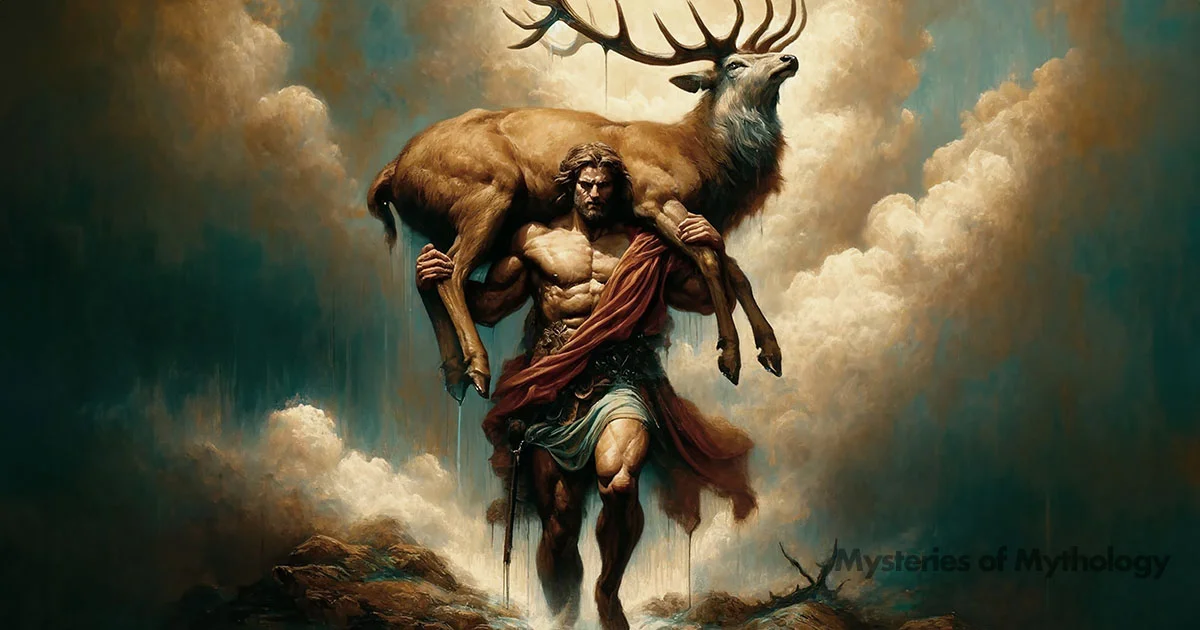
Artemis and Apollo, understanding Heracles’s situation and wanting to frustrate Hera’s plans, agreed to let Heracles continue. Artemis let Heracles go on the condition that he release the hind after showing it to Eurystheus.
Heracles thanked the goddess and returned to Eurystheus, who was shocked to see Heracles succeed again. After he showed Eurystheus the hind, Heracles kept his promise to Artemis and set the animal free, then asked Eurystheus for his next task.
Labour Four: The Erymanthian Boar
For his fourth labour, Eurystheus tasked Heracles with capturing a giant boar that was wreaking havoc around Mount Erymanthus. (It was quite common for monstrous animals to terrorize towns in ancient Greece.) Heracles took off with great enthusiasm, seeing the task as just another adventure, and decided to stop by his friend, the centaur Pholus, along the way.
Centaurs were typically wild, being half-man and half-horse, but Pholus was an exception. He was kind and smart, and had been friends with Heracles since their younger days. To celebrate Heracles’ visit, Pholus threw a dinner party, inviting a few local centaurs, including Chiron, the wise, immortal centaur who had taught Heracles archery.
The party was filled with good food and lively chats. Heracles spent some time catching up with Chiron, then went for a walk. During his walk, he found a jar of wine on Pholus’s shelf and opened it to have some. Unbeknownst to him, this wine was a precious gift from the god Dionysus to the centaurs, kept for generations because of its special qualities. Opening the jar released a strong aroma that spread far and wide.
As Heracles returned to the party, he was met by a group of angry centaurs who were upset about him drinking their special wine. Despite Pholus and Chiron’s efforts to calm things down, more centaurs came, drawn by the scent of the wine. They attacked Heracles in a fury. Though outnumbered, Heracles fought back using arrows dipped in the Hydra’s toxic blood. The battle was fierce, and many centaurs were killed or driven away. In the chaos, Heracles accidentally wounded Chiron. Although immortal and unable to die, Chiron suffered immense pain from the poison. Seeing this, Zeus felt sorry for him and placed his spirit in the stars as the constellation Sagittarius.
During the commotion, Pholus picked up one of Heracles’ poisoned arrows to examine it and accidentally dropped it on his foot, killing himself instantly. After driving away the other centaurs, Heracles returned to find his friend and teacher dead. Filled with regret and sadness, he buried Pholus and paid his respects before resuming his mission to capture the boar.
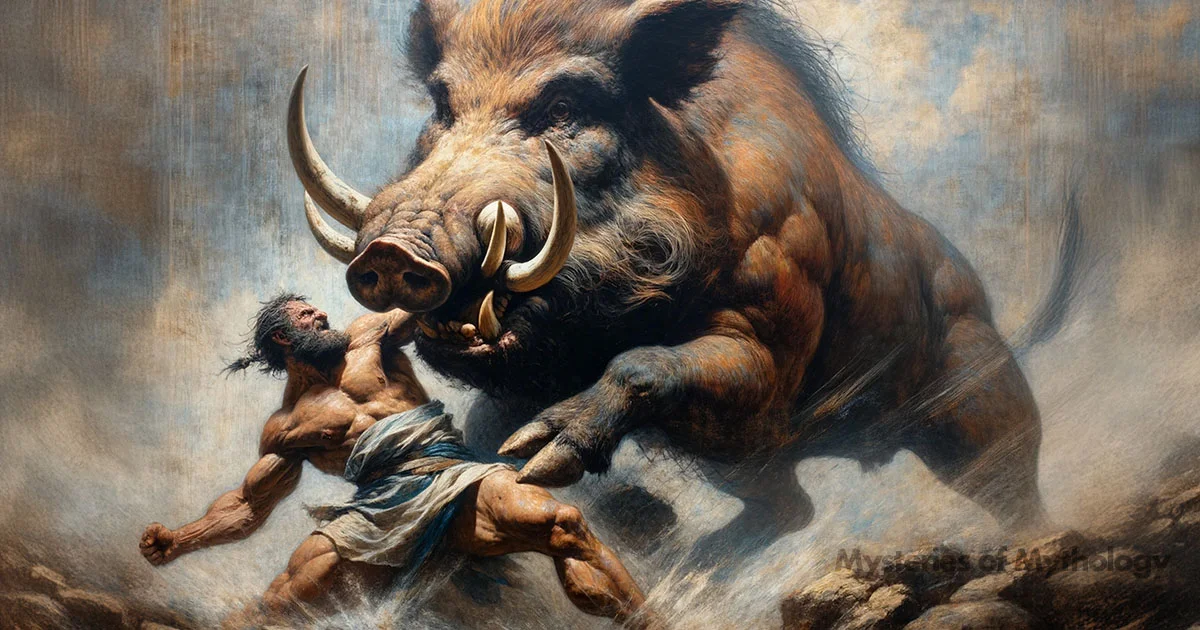
Heracles finally managed to trap the boar by driving it into deep snow and securing it with chains. He brought the captured boar back to Eurystheus. Terrified by the sight of the enormous boar, Eurystheus hid inside a large storage jar and refused to come out until Heracles removed the creature. Amused by Eurystheus’ fear, Heracles let the boar go. Once the boar was gone, Eurystheus, feeling embarrassed, crawled out of the jar and quickly sent Heracles to his next task.
Labour Five: The Augean Stables
For his fifth labour, Heracles had to clean the massive Augean stables in just one day without any help and using only his hands. Eurystheus, who assigned this task, thought it was impossible and was sure Heracles would fail. The stables, belonging to King Augeas of Elis, were home to 3,000 immortal cattle and hadn’t been cleaned in 30 years. The waste had piled up so high and the smell was so bad that no one could even get close, with dung overflowing into nearby fields, ruining them.
When Heracles arrived in Elis, he was welcomed by a crowd that celebrated him as a hero for dealing with dangerous beasts in other regions. Motivated by their support, Heracles went to King Augeas and made a deal: if he succeeded by nightfall, he would receive one-tenth of the cattle. Doubting Heracles’ ability, Augeas sent his son Phyleus to watch him.
The stables were a nightmare, stretching as long as a small city, filled with an unbearable stench and mounds of dung. Heracles decided to get creative with the nearby rivers Alpheus and Peneus. He manually dug a channel, diverting the rivers straight into the stables. The water rushed through, cleaning out years of filth and then enriching the surrounding farmland with nutrients from the manure. The locals were thrilled, knowing their farms would thrive.
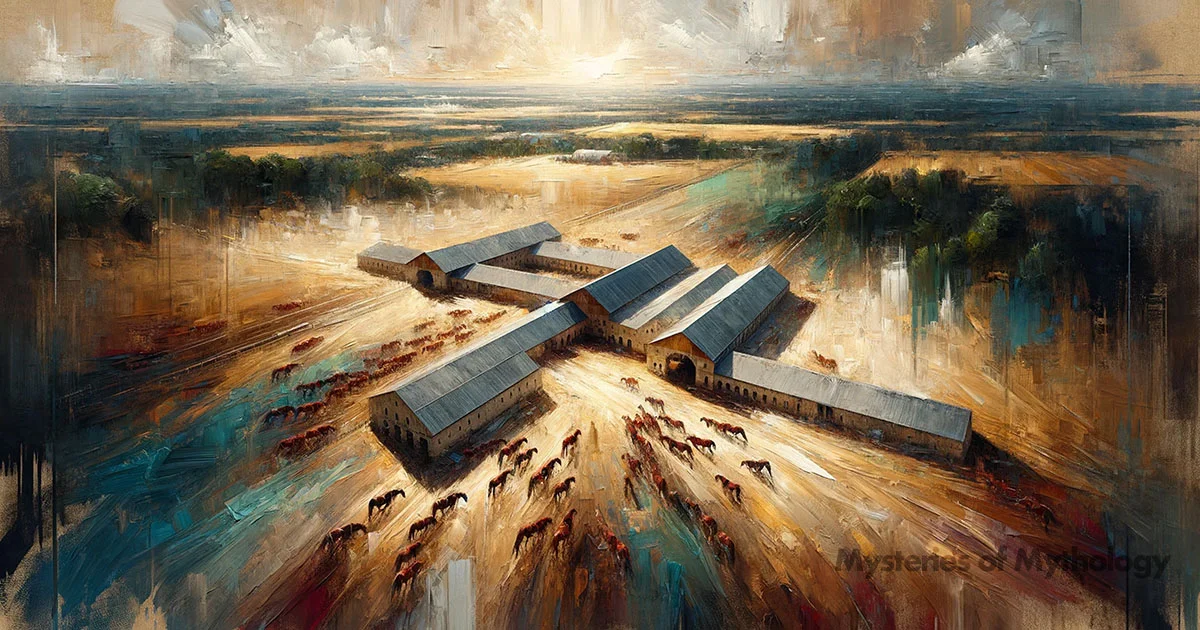
However, when King Augeas finds out how Heracles managed the task, he is furious. He had only agreed to the reward because he believed the job couldn’t be done. Even though Heracles followed the rules using just his hands, Augeas refused to pay up, claiming Heracles had cheated by using the river gods’ powers. Heracles suggested that the local leaders, who had seen everything, judge the dispute. During the trial, Phyleus confirmed Heracles had met his part of the deal. In anger, Augeas threw both Heracles and Phyleus out of Elis.
To make things worse, Eurystheus wouldn’t count this as a completed labour since Heracles had aimed to gain from it. Undeterred, Heracles left to receive his next task, planning to deal with Augeas later. After finishing his labors, Heracles returned, took revenge on King Augeas, and put Phyleus in charge. To celebrate, he started the famous Olympic Games, held every four years in Elis.
Labour Six: The Stymphalian Birds
For his sixth labour, Heracles needed to get rid of a bunch of dangerous birds that were terrorizing the area around Lake Stymphalus. These weren’t ordinary birds; they were sacred to the war god Ares and had iron beaks sharp enough to cut through the strongest armor.
When Heracles got to the lake, he found his real challenge wasn’t killing the birds but actually finding them. They were hidden deep in the dense, swampy areas around the lake. Killing a few each day wouldn’t work; it would take way too long, especially since Heracles had to finish all his tasks within ten years.
Luckily, Heracles wasn’t completely on his own. His father, Zeus, watched over him from the sky. Although Zeus couldn’t help directly because it would upset Hera even more, he did ask other gods to give Heracles a hand when they could.
Athena, watching over her half-brother, spotted a chance to assist. While Heracles was checking out the area, he heard metal clanging. Turning around, he saw a divine figure disappearing into the woods. When he went to check it out, he found a pair of bronze rattles lying on an old willow tree trunk. The rattles were clearly made by the gods.
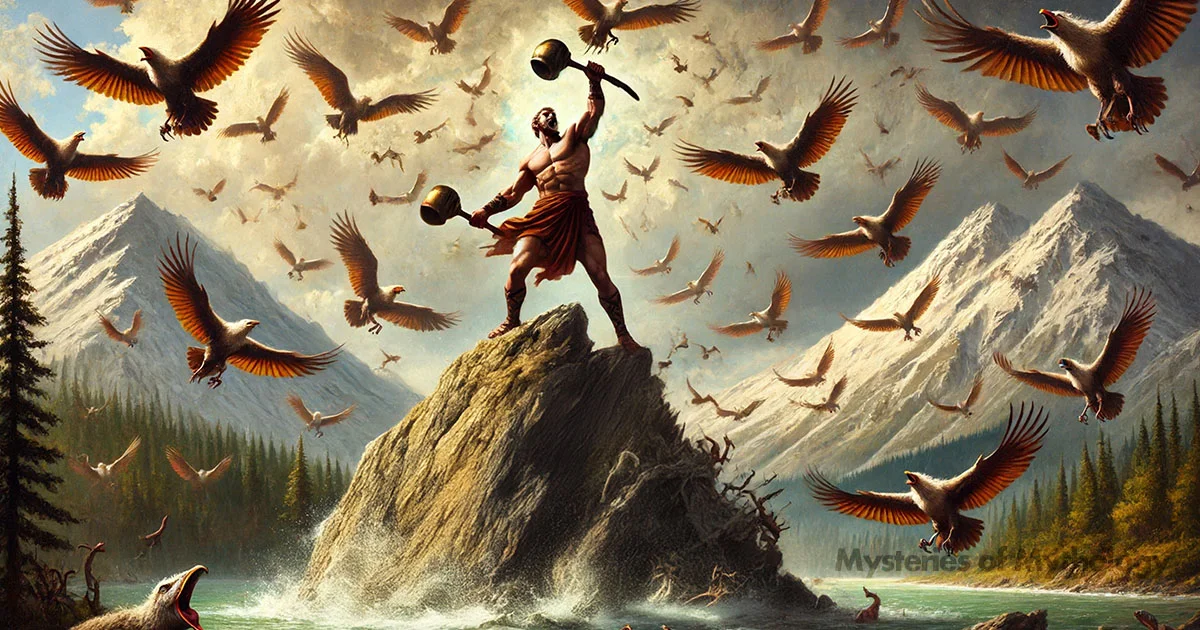
Heracles took these rattles to a hill overlooking the marsh. They didn’t seem very special at first, but when he shook them, the sound hurt the birds badly. This caused hundreds of them to fly up from the lake, screeching in pain. Now grouped together, they were an easy target. Heracles then shot them with arrows coated in Hydra’s poisonous blood, killing them instantly. The remaining birds quickly flew away in fear.
With the lake cleared of the birds, Heracles completed his labour.
Labour Seven: The Cretan Bull
For his seventh labour, King Eurystheus sent Heracles to Crete, as Eurystheus had run out of challenging tasks in his own kingdom. There, King Minos had a task for Heracles. Minos had a magnificent white bull that was a gift from Poseidon, the sea god, who expected it to be sacrificed in his honour. However, Minos decided to keep the stunning bull.
Poseidon retaliated by making Minos’s wife fall in love with the bull. This bizarre situation led to the Minotaur’s birth, a half-man, half-bull creature, which Minos kept in a labyrinth under his palace.
Poseidon then drove the bull mad, and it started destroying Crete. Although it wasn’t Heracles’ job to deal with the Minotaur—that was a task for the hero Theseus—Minos wanted Heracles to capture the rampaging bull.
Feeling confident from his past victories, Heracles went after the bull. When the bull charged, Heracles grabbed it by the horns and wrestled it to the ground. After hours of struggle, the tired bull gave up. Since the bull was Poseidon’s offspring, it could walk on water. Heracles rode it across the sea back to Mycenae.
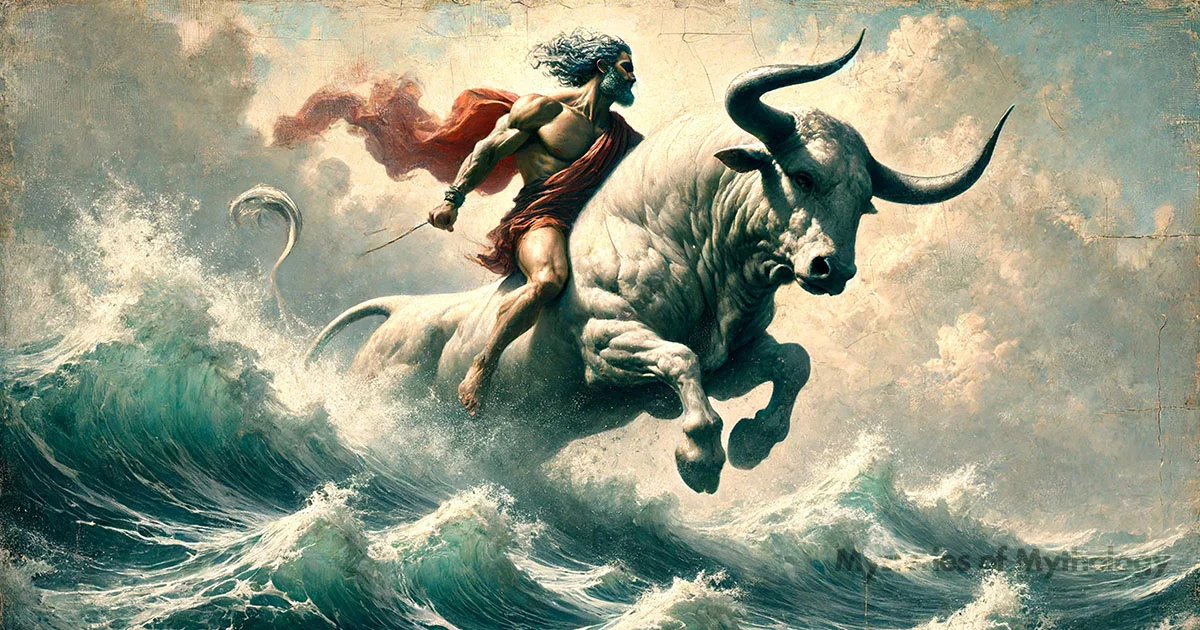
When they arrived, Eurystheus was terrified at the sight of another mythical creature and hid in a storage jar, refusing to come out until Heracles took the bull away. Respecting that the bull was sacred to Poseidon, Heracles set it free outside the palace. The bull continued its rampage on the Greek mainland until it was eventually caught and killed by Theseus.
Labour Eight: The Mares of Diomedes
For his eighth labour, Heracles was ordered to capture the dangerous mares of Diomedes, the king of Thrace. These were not ordinary horses; they were terrifying animals that could breathe fire and were extremely aggressive. This was because Diomedes fed them human flesh, even from his own guests.
Heracles travelled to Thrace with his lover Abderus, the son of Hermes. When they reached Diomedes’ palace, they found the fiery mares chained to the palace walls, fiercely struggling and frothing at the mouth. Nearby was a bucket of human flesh, which upset Abderus. He chose to stay outside while Heracles went in to talk with the king.
King Diomedes was a frightening sight—dirty, with wild eyes and blood on his hands from feeding his horses. Despite feeling disgusted, Heracles tried to negotiate with him. Suddenly, a scream from outside interrupted them. Heracles ran out to see the mares attacking Abderus, who had gotten too close out of curiosity. Furious, Heracles stormed back into the palace, overpowered the guards, and seized Diomedes. He dragged the king outside and threw him to the mares, who quickly attacked him.
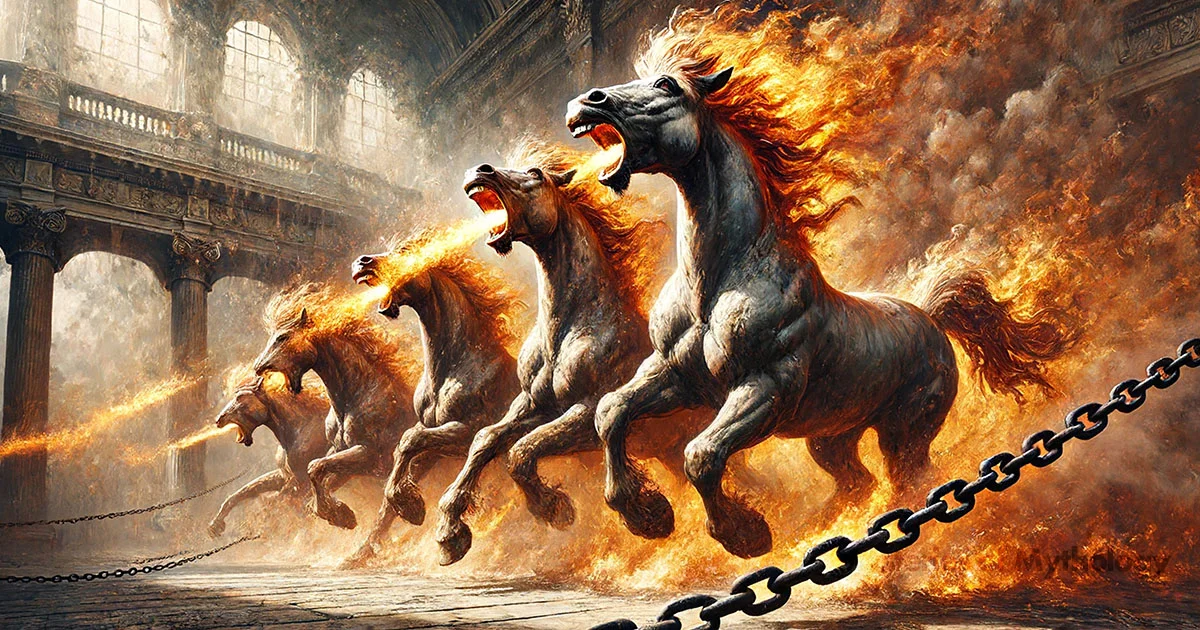
The horses ate Diomedes but stopped halfway, repulsed by his flesh, and they never ate human flesh again.
Disappointed that the mares were no longer fierce, King Eurystheus decided to keep them in his stable as part of his royal collection.
Labour Nine: The Girdle of Hippolyta
For his ninth task, Heracles had to fetch the girdle of Hippolyta, a belt made of gold and leather that promised victory in battle. This request didn’t come from King Eurystheus but from his daughter, Admete.
Admete was a fan of Heracles, but she admired someone even more: Hippolyta, the famous Queen of the Amazons. The Amazons were warrior women who lived far from known civilisation and were known for their fighting skills and control over neighbouring tribes. Their queen, Hippolyta, daughter of the war god Ares, owned a magical girdle from her father that made her unbeatable in battle. It was this girdle that Admete wanted.
Heracles travelled east with a few warriors, prepared for a possible fight with the Amazons. However, they were greeted warmly by the Amazons, who offered them food and shelter—this was not the hostile welcome Heracles expected.
Hippolyta herself took a keen interest in Heracles, having heard of his legendary labours. She invited him to her home, where she asked about his adventures. They got along well, and Heracles hesitated to forcefully take the girdle. He decided to be upfront and shared the reason for his labour and Admete’s wish. Surprisingly, Hippolyta agreed to give him the girdle as a gesture of friendship and handed it to him willingly.
But Hera, who always sought to undermine Heracles, disguised herself as an Amazon and stirred up trouble. She spread rumours that Heracles intended to enslave the Amazons and kidnap Hippolyta. Furious, the Amazons attacked Heracles and his men.
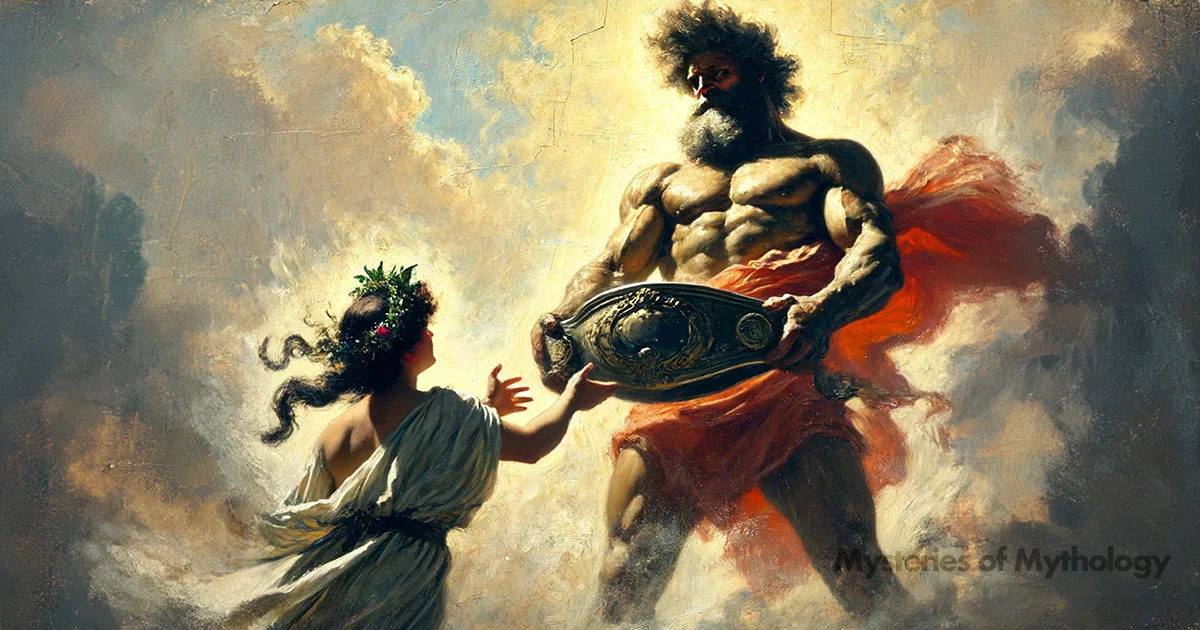
Heracles, hearing the chaos, saw the Amazons attacking and thought Hippolyta had betrayed him. In anger, he killed her before she could explain, though she had already given him the girdle. Heracles then battled the enraged Amazons, saving some of his men, and they fled back to Mycenae.
Back home, Heracles gave the girdle to Admete, leaving out the violent details of how he got it. King Eurystheus, upset by Heracles’ continued success, sent him to the distant island of Erytheia, hoping to keep him away longer and delay dealing with him.
Labour Ten: The Cattle of Geryon
For his tenth task, Heracles had to travel to Erytheia to steal the cattle of Geryon, a terrifying giant with three heads. He set off on a long journey to the world’s edge, travelling southwest along Africa’s coast. The intense heat of the continent soon irritated Heracles, leading him to threaten the sun itself. In the Libyan desert, he aimed his bow at the sun and threatened to shoot it with his poisoned arrows if it didn’t stop bothering him.
The sun, in the form of the god Helius, came down to plead with Heracles, promising to lessen its glare for the rest of his journey. In gratitude, Helius also offered Heracles a huge golden cup shaped like a water lily, which he used to sail the ocean at night. Heracles accepted this gift and continued his travels in the magical cup.
When he reached the Atlantic Ocean, Heracles celebrated by setting up two markers, one on the African side and the other on the European side, now known as the Pillars of Hercules—Ceuta and the Rock of Gibraltar.
As he sailed on, Heracles faced stormy seas and threatened the Titan Oceanus with his arrows. Oceanus calmed the waves in fear, allowing Heracles to continue his journey. Once he reached Erytheia, Heracles found the cattle and their giant owner, Geryon. Before confronting Geryon, he dealt with the cattle’s herdsman, Eurytion, and Orthrus, a two-headed dog. Using his club, Heracles quickly took them out.
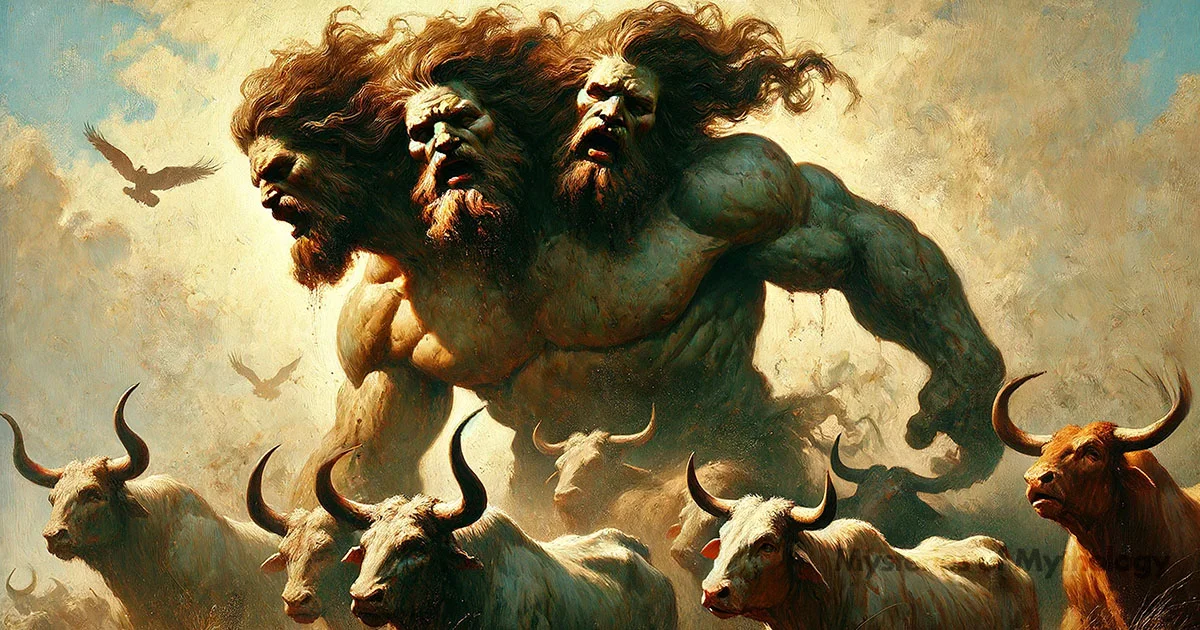
Wanting to finish his task quickly, Heracles shot Geryon with a poisoned arrow, killing him instantly. He then herded the cattle into Helius’s cup and sailed home. However, Hera interfered by sending a swarm of gadflies to scatter the cattle, some of which ran off into the mountains. Despite his efforts, Heracles couldn’t gather all of them but managed to return to Mycenae with the rest, returned the magical cup to Helius, and delivered the cattle to Eurystheus, who sacrificed them to Hera.
Thinking he was finally free after ten years and ten labours, Heracles prepared to leave, cleansed of his past misdeeds. Yet, Hera had reminded Eurystheus of the original terms the night before Heracles had to complete his tasks alone and without payment. Because Heracles had received help during some tasks and was promised payment for another, Eurystheus declared that he still owed two more labours. This revelation shocked Heracles, as Eurystheus hinted that the toughest challenges were yet to come.
Labour Eleven: The Apples of the Hesperides
For his eleventh task, Heracles needed to get the golden apples from the Garden of the Hesperides, which were said to give immortality. These apples were on a tree watched over by Ladon, a dragon with a hundred heads, placed there by Hera. The garden’s exact location was a mystery.
Heracles started his quest by freeing the Titan Prometheus, who Zeus had punished for giving fire to humans. Prometheus was chained to a rock, suffering as an eagle ate his liver every day. After Heracles saved him and killed the eagle, Prometheus told him where the garden was but warned that no mortal could pick the apples. Instead, he suggested getting help from the nearby Titan, Atlas.
Ignoring this advice, Heracles climbed into the garden and killed Ladon with a poisoned arrow. However, when he tried to grab an apple, it disappeared, proving Prometheus right. Heracles then sought Atlas’ help.
Atlas, who Zeus had punished to hold up the sky forever, agreed to fetch the apples if Heracles held the sky in his place. Carrying the sky was incredibly hard, even for Heracles. When Atlas returned with the apples, Heracles tricked him into taking the sky back so he could adjust his pelt. Once Atlas held the sky again, Heracles took the apples and left.
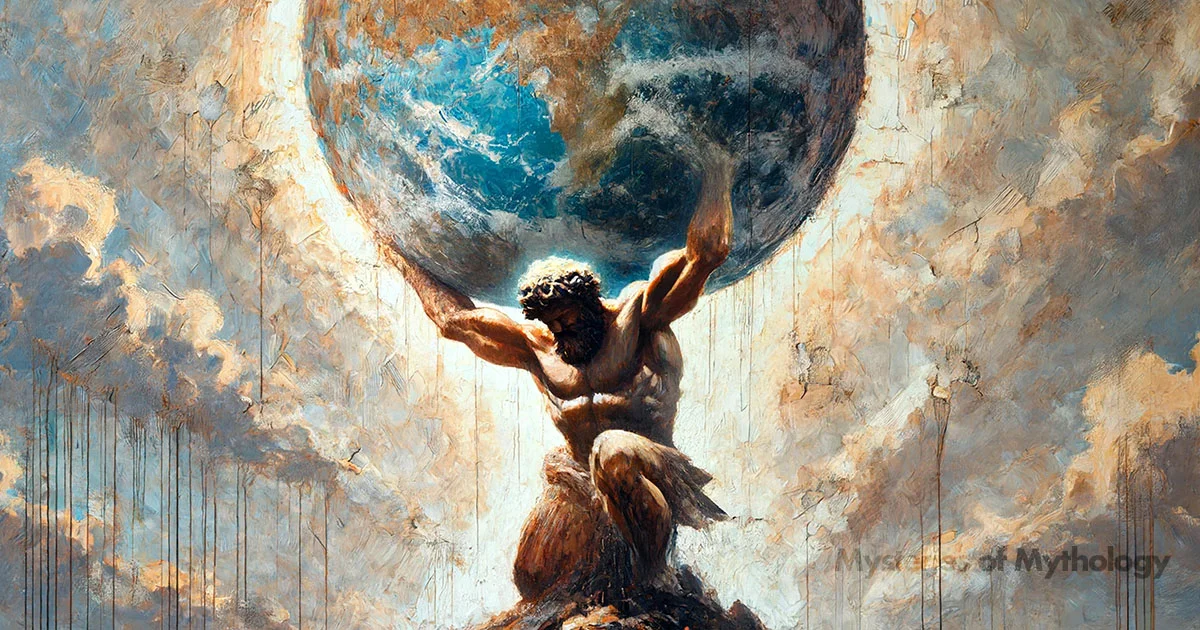
Returning the apples to Eurystheus, they ended up being placed in Athena’s temple overnight by Eurystheus, knowing from Hera they needed to be returned to the garden, which Athena did.
Labour Twelve: The Capture of Cerberus
In his final labour, Heracles had to capture Cerberus, the three-headed dog guarding the underworld. Hermes, the messenger god, helped him, guiding him to the underworld’s gates.
Heracles avoided their anger by asking Hades and Persephone for permission to take Cerberus. Hades agreed but set conditions: Heracles couldn’t use weapons and had to bring Cerberus back. Heracles managed to capture Cerberus by wrestling it into exhaustion.
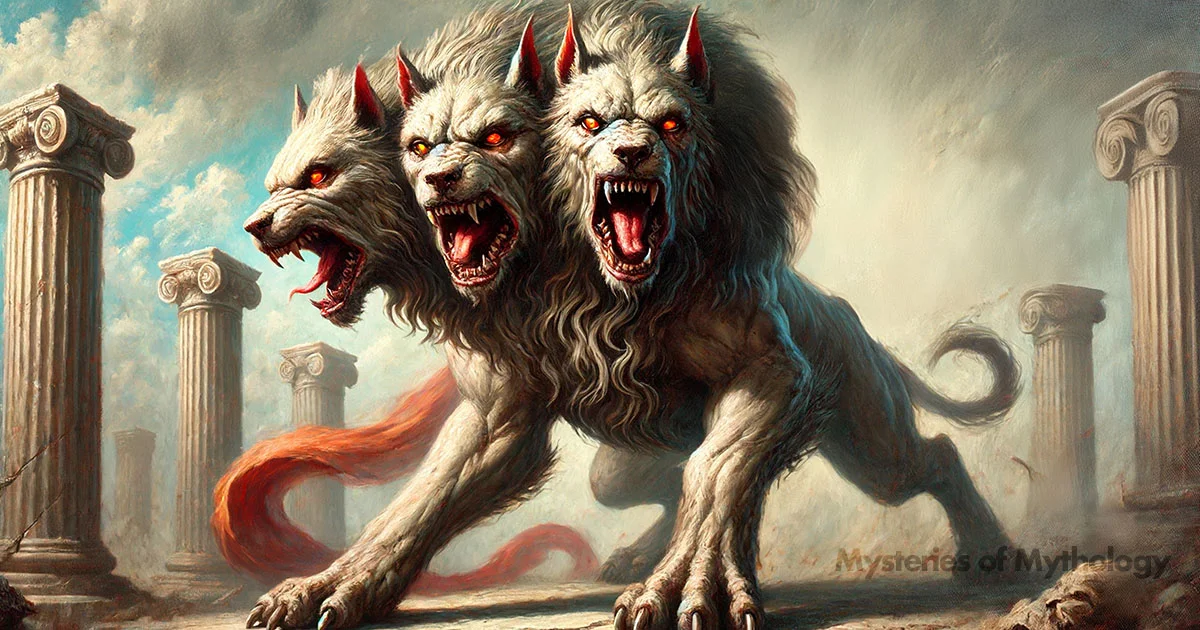
Returning with Cerberus, Heracles met the spirit of Meleager, his deceased friend. In honour of their friendship, Heracles promised to marry Meleager’s sister, Deianira. Heracles then presented Cerberus to King Eurystheus, who was terrified and hiding. Eurystheus agreed to free Heracles from his duties, allowing him to return Cerberus to the underworld and move on to new adventures as a free man.
Other Myths
There is a similar myth about Heracles being forced to undergo a period of servitude in order to atone for a crime: this time, Heracles was told to serve the Lydian queen Omphale after he went mad and threw his friend Iphitus from a city wall to his death.
As Omphale’s slave, Heracles was forced to wear women’s clothing and do what was traditionally considered women’s work (such as weaving) while Omphale wore his lion skin and wielded his club. Eventually, Omphale freed Heracles and became his wife.
Other myths take Heracles to almost every corner of the known world. In Africa, Heracles fought and killed the giant Antaeus. A son of the earth, Antaeus was invincible as long as he was in contact with the ground. Heracles finally defeated him by lifting him into the air and breaking his back.
In Asia, Heracles sacked Troy after its king, Laomedon, cheated him. Laomedon had promised to give Heracles his prize horses if the hero rescued his daughter Hesione from a sea monster. Heracles saved Hesione, but Laomedon refused to hand over the horses. This did not sit well with Heracles, who sacked Troy, killed Laomedon, and claimed the horses he had been promised.
Heracles also travelled with Jason and the Argonauts to Colchis (on the eastern coast of the Black Sea) to steal the Golden Fleece from King Aeetes. Heracles was accompanied by the young Hylas, who was his shield-bearer and lover. However, Hylas disappeared at one of the Argonauts’ stops on their way to Colchis. Heracles went in search of him, and the Argonauts left without them. Heracles, therefore, did not make it to Colchis with the Argonauts.
According to some traditions, Heracles even went up to Olympus to help the gods in their war against the Giants.
The Death of Heracles
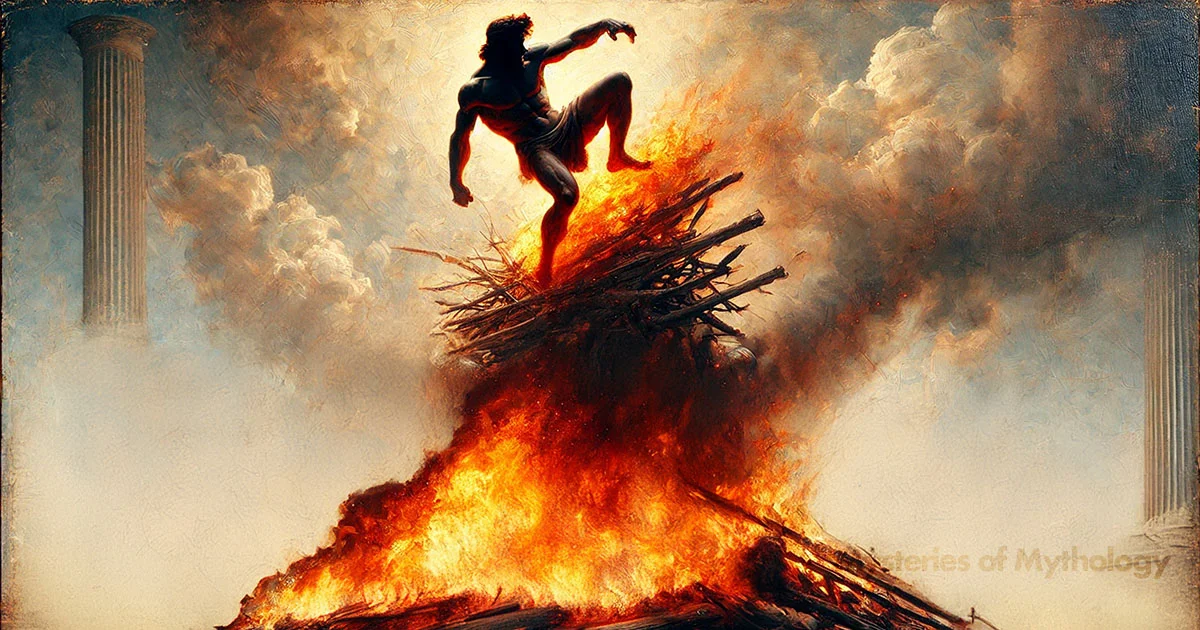
After completing his legendary labours and adventures, Heracles returned to a life of leisure, enjoying the adoration that came with being a renowned hero. His fame had spread far and wide, attracting followers and admirers wherever he went. He continued to seek out excitement, joining notable figures like Jason and the Argonauts in their epic quest to capture the mythical Golden Fleece.
In time, Heracles decided to honour a commitment he had made to the spirit of Meleager during his final labour. He sought out Meleager’s sister, Deianira, and married her, fulfilling his promise. As the newlyweds journeyed towards their new home in the city of Tiryns, they encountered a significant obstacle—a swiftly flowing river that barred their way.
On the river’s bank, they met Nessus, a centaur who offered to help by carrying Deianira across the river on his back. Heracles agreed, not realizing that Nessus was the sole survivor of a massacre he had inflicted on the centaur tribe years before during one of his labours. Nessus had harboured a grudge for over a decade and saw this as the perfect opportunity to exact his revenge.
Once they reached the opposite bank, Nessus betrayed Heracles’ trust by attacking Deianira. Watching from the other side, Heracles quickly drew his bow and shot Nessus with an arrow poisoned with the lethal blood of the Hydra. Struck through the chest, Nessus fell, mortally wounded and in agony. With his dying breaths, Nessus devised a deceitful plan for vengeance. He apologised to Deianira and offered her a “gift”—his blood, which he falsely claimed possessed magical properties that could ensure Heracles’ fidelity.
Deianira, deceived by Nessus’ final act of manipulation, collected the blood, believing it would bind Heracles to her should he ever waver in his affections. The couple then settled in Tiryns and enjoyed several years of happiness, during which they had children and built a life together. However, Heracles’s restless spirit soon yearned for his past adventures.
Driven by a desire for new challenges (he wasn’t a family man), Heracles left his family behind and travelled to the kingdom of Oechalia, where he was reunited with his old archery tutor, King Eurytus. During his visit, Heracles quickly fell in love with the king’s beautiful daughter, Iole. An archery competition was announced, with Iole’s hand in marriage as the prize. Heracles, with his unmatched skills, easily won the contest. However, King Eurytus, aware of Heracles’ dark past and his previous violent acts, refused to allow his daughter to marry the hero.
Enraged by the king’s refusal, Heracles stormed out of the palace. He later returned, overpowered by his passions, and kidnapped Iole along with other noblewomen from the city, bringing them back to Tiryns. When Heracles arrived home with Iole and the other captives, Deianira initially rejoiced at his return but soon grew suspicious of his intentions, especially towards Iole.
Tormented by jealousy and fear of losing Heracles’ love, Deianira retrieved the vial of Nessus’ blood. Hoping it contained the promised magical properties, she coated a robe with the blood and gifted it to Heracles, urging him to wear it to a banquet that evening. As soon as Heracles donned the robe, he felt a horrifying burning sensation. The Hydra’s poison in the blood adhered to his skin, causing excruciating pain and beginning a slow, torturous end.
Heracles’ agony was unbearable; he tried desperately to remove the robe but, in doing so, tore away parts of his own flesh. Realising the horrific consequences of her actions and the truth about Nessus’ deceit, Deianira was overcome with guilt and sorrow. In her despair, she took her own life.
Knowing his end was near, a tormented Heracles gathered his strength to build a large funeral pyre in his courtyard. He laid himself upon it and requested his friends to light it, seeking release from his pain through the purifying fire. As the flames consumed him, a storm cloud gathered above, and Zeus, watching from the heavens, saw the mortal part of his son burn away. At that moment, he took Heracles’ spirit and brought it to Olympus, transforming him into an immortal, ending his earthly torments and granting him a place among the gods.
Worship
In ancient Greece, Heracles was both a hero and a god, celebrated with festivals known as “Heracleia” across the country. These festivals were especially popular in regions like Attica, where they were held at places like Cynosarges and Marathon, and in the Peloponnese, in cities such as Sicyon and Sparta. In Boeotia, significant celebrations took place in cities like Thebes and Thespiae.
In the north, Ambracia, the main city of Epirus, held a notable festival for Heracles. Another important festival, the Iolaia, took place in Thebes, commemorating Heracles’ deeds.
Regarding temples, there were many dedicated to Heracles throughout Greece. Important sanctuaries were in Attica at Cynosarges and Marathon and in Boeotia at places including Thebes and Orchomenus. Sparta had a temple near its city walls. Thebes boasted a large sanctuary complex with temples, a gymnasium, and a racecourse. There were also memorials to the tragic events involving Heracles and his family, like the tombs of his children and a stone called the “Chastiser” which was linked to a legend of Athena stopping Heracles’ madness.
Remote locations also featured temples of Heracles, such as one on Mount Oeta, where he died, and a Doric temple from the early fifth century BCE in Sicily at Acragas.
The Romans, who worshipped him as Hercules, built numerous temples and altars throughout Rome, Italy, and the broader Roman Empire, celebrating his legendary exploits.
Pop Culture
Heracles, often known by his Roman name Hercules, remains a favourite in modern media. He was a mainstay in the “sword-and-sandal” genre that boomed during the 1950s to 1970s. These films typically showcased his physical prowess, with bodybuilders like Steve Reeves starring in classics like Hercules (1958) and Hercules Unchained (1959). Jason and the Argonauts (1963) featured Hercules as part of the crew, while Hercules in New York (1970) took a more comedic approach, with a young Arnold Schwarzenegger’s Hercules inexplicably transported to 20th-century New York City.
Disney’s animated Hercules (1997) introduced the myth to a younger generation in a lighthearted and humorous way. The 1990s saw Kevin Sorbo portray the hero in the television series Hercules: The Legendary Journeys and related movies, further solidifying Hercules’ place in popular culture. More recently, Dwayne Johnson brought his signature charisma to the role in the 2014 film Hercules.
Beyond the Strongman
While often depicted as the quintessential strongman or brute, typically played by bodybuilders or athletes like Steve Reeves, Arnold Schwarzenegger, and Dwayne Johnson, Hercules’ portrayals haven’t been limited to just physical prowess. He can also be a source of amusement. The Three Stooges Meet Hercules (1962) is a comedic take on the myth, and Disney’s Hercules (1997) injects humour into the character while still maintaining his heroic qualities.
Interestingly, some interpretations offer a twist. In DC Comics, Hercules has occasionally been portrayed as a villain, clashing with Wonder Woman and exhibiting a darker, more violent personality.
Modern portrayals have begun to move beyond the classic strongman image. The 2014 film Hercules (with Dwayne Johnson) explores themes of redemption and questioning the gods, offering a more complex look at the character. Hercules has also found his way into the gaming world, appearing as a playable character in titles like God of War and Smite. Here, he uses his signature strength and weapons to dominate the battlefield.
Frequently Asked Questions
Are Hercules and Heracles the same?
Yes, Hercules and Heracles refer to the same mythological hero. Heracles is the original Greek name, while Hercules is the Roman adaptation.
What is Heracles the god of?
Heracles is not a god but a divine hero in Greek mythology. He is known for his strength and for his numerous far-ranging adventures, known as the Twelve Labors.
Why did Disney call it Hercules not Heracles?
Disney chose Hercules for the title of their movie because this Roman version of the name is more widely recognised and familiar to modern audiences, particularly in the Western world.
Why is Hercules spelled Heracles?
Heracles is the original Greek spelling of the name, which literally means the glory of Hera, reflecting part of his mythological origin. Hercules is the Romanized version of the name.
Why did Hera hate Hercules?
Hera hated Hercules because he was the son of Zeus and a mortal woman, Alcmene. Hera, Zeus’s wife, was notoriously jealous of Zeus’s affairs with other women and often directed her anger towards the children born from these liaisons, especially Hercules.
References
In Archaic Greece, some poets, notably Peisander (seventh century BCE) and Panyassis (fifth century BCE), composed long epics about Heracles and his deeds, although these works have not survived. Despite this, Heracles remained a celebrated figure in ancient literature, appearing in numerous poetic and prose works. Below is a roughly chronological compilation of key Greek and Roman texts that feature Heracles (referred to as Hercules in Roman sources).
Greek
Homer: Heracles is mentioned in both the Iliad and the Odyssey, the oldest extant pieces of Greek literature (typically dated to the eighth century BCE). In the Iliad, several references are made to Heracles’ conquest of Troy during Laomedon’s reign (7.451–53; 20.145–48; 21.442–57). In the Odyssey, Odysseus sees Heracles’ spirit in the underworld (11.601–4).
Hesiod: In the seventh century BCE, Hesiod’s works, such as the Theogony and Catalogue of Women, featured Heracles. The Shield of Heracles details his battle against Cycnus, son of Ares.
Pindar: Around 518–446 BCE, Pindar frequently celebrated Heracles in his poems. Nemean Ode 1 recounts Heracles killing serpents sent by Hera as an infant, and his later heroic feats are covered in other works, including Olympian Odes 9 and 10, Pythian Ode 4, Nemean Odes 3 and 4, and Isthmian Odes 4 and 6. Pindar also credits Heracles with founding the Olympic Games (Olympian Odes 2.3–4, 3.11–40, 6.67–69, 10.25–26, 45–62).
Sophocles: The Trachinian Women (ca. 450–425 BCE) explores the circumstances surrounding Heracles’ death.
Euripides: Heracles appears in several of Euripides’ tragedies, such as Alcestis (ca. 438 BCE), where he saves Admetus’ wife from Death, and Heracles (ca. 416 BCE), which portrays his tragic killing of his own family.
Aristophanes: In Birds and Frogs, Heracles is depicted humorously as a gluttonous, bumbling figure.
Theocritus: Idyll 13 (third century BCE) tells of Heracles’ young lover, Hylas, who is kidnapped by water nymphs. Heracles is also featured in Idylls 24 and 25.
Apollonius: Heracles is a significant character in the Argonautica (third century BCE), an epic poem narrating Jason’s and the Argonauts’ adventures.
Strabo, Geography: This is a vital late first-century BCE source that details many local Greek myths, practices, and religious institutions.
Pausanias, Description of Greece: This second-century CE guidebook, like Strabo’s work, is crucial for understanding local myths and customs.
Roman
Propertius: This first-century BCE poet captured the poignant tale of Heracles’ lover, Hylas, in one of the Elegies (1.20).
Ovid: Heracles’ many adventures are chronicled in the Metamorphoses and the Fasti, both likely written around 8 CE. Additionally, Ovid explores Heracles’ myth in Heroides 9 (25–16 BCE), presented as a letter from his wife, Deianira.
Seneca: His first-century CE tragedies, The Madness of Heracles and Heracles on Oeta, recount the hero’s murder of his family and his death, respectively.
Valerius Flaccus, Argonautica: This late first-century CE Latin epic parallels Apollonius’ earlier work, also highlighting Heracles in the story of Jason and the Argonauts

